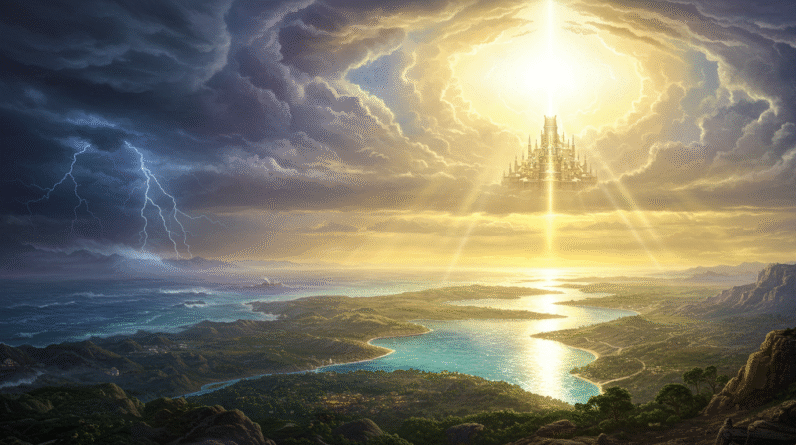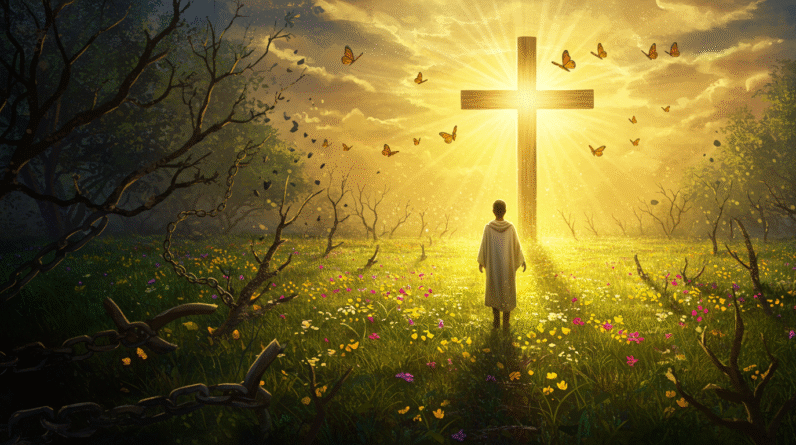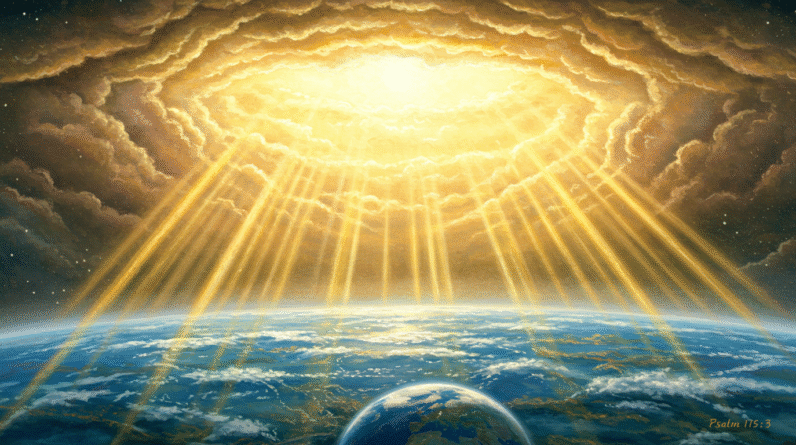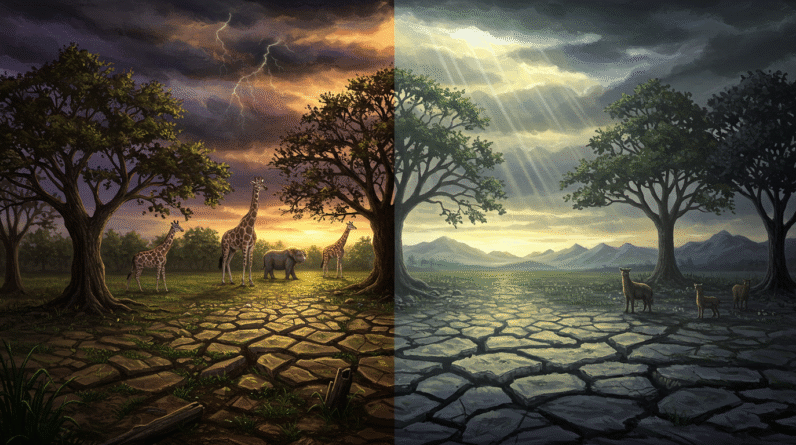God The Beginning Of All Things (Genesis 1:1)
When you open the Bible, the very first sentence strikes you with calm and authority: “In the beginning God created the heavens and the earth.” That simple declaration in Genesis 1:1 tells you where everything starts — not with chance, not with chaos, but with a Person. You’re invited to stand at the doorway of the Scriptures and see the Creator, the One who brought all things into being. Read it for yourself: Genesis 1:1.
Reading the First Sentence: Why Genesis 1:1 Matters
You might think a single verse can’t carry much theological weight, but Genesis 1:1 sets the stage for everything Scripture will say about God, humanity, sin, salvation, and hope. That opening line establishes that the universe has its source, its purpose, and its Author. When you accept that God is the beginning of all things, you begin to understand your own place in the world — created, cared for, and accountable to the One who made you.
“In the beginning”: What does that phrase mean?
When you ponder “In the beginning,” you’re looking at a phrase that treats time itself as something created. It’s not a casual remark about the start of a particular event; it’s a profound statement that history — measured time — has a starting point under God’s authority. This isn’t just ancient storytelling; it’s a theological claim that the cosmos is contingent, dependent on God for its existence. That’s why the Bible can honestly speak of history and purpose, not mere cycles without meaning.
“God”: The Hebrew word and its meaning
In Genesis 1:1 the Bible uses the Hebrew word “Elohim” for God, a name that points to power and majesty. You’ll notice it’s a plural form, yet it takes singular verbs, suggesting both unity and richness in the divine nature. This diction prepares you for deeper revelation later in Scripture about God’s relational nature. The Bible isn’t describing an impersonal force; it’s revealing a living, personal God who thinks, wills, speaks, and acts.
“Created”: Creation out of nothing (creatio ex nihilo)
One of the most comforting and awe-inspiring truths you find in the opening chapters is that God created the universe out of nothing. Hebrews 11:3 explains this to you plainly: “By faith we understand that the universe was formed at God’s command, so that what is seen was not made out of what was visible.” Read it here: Hebrews 11:3. That means you don’t have to imagine God tinkering with preexisting materials. The cosmos owes its very being to God’s word and will.
The Old Testament witnesses to God as Creator
Throughout the Old Testament, prophets and psalmists return to the theme of God as Creator. For instance, Psalm 33 declares: “By the word of the LORD the heavens were made, their starry host by the breath of his mouth.” See it here: Psalm 33:6. Isaiah reminds you that God formed the earth to be inhabited and fashioned it with purpose: Isaiah 45:18. These passages don’t merely recount events; they call you to recognize God’s sovereignty and wisdom in making a world for life and relation.
The New Testament confirms the Creator role of Christ
If you turn to the New Testament, you’ll find that Jesus himself is identified with the Creator. John begins with a profound echo of Genesis: “In the beginning was the Word, and the Word was with God, and the Word was God… Through him all things were made.” Read John’s opening here: John 1:1-3. Colossians makes it explicit that Christ is the agent of creation: “For in him all things were created… all things have been created through him and for him.” See it here: Colossians 1:16-17. That means when you worship Jesus, you’re worshiping the One through whom the world was made.
Creation and the worship of God
Scripture repeatedly links the act of creating with the act of worship. Revelation invites you to join the heavenly chorus that praises God for making all things: “You are worthy, our Lord and God, to receive glory and honor and power, for you created all things…” Read that worshipful confession here: Revelation 4:11. When you stand at the crossroads of daily life, remembering God as Creator draws you into awe and reverence. Worship becomes fitting because the universe itself declares God’s handiwork.
Theologically, what does creation tell you about God’s character?
Knowing God as Creator shapes how you see his attributes. Creation speaks of God’s power — he brings worlds into being by his word. It speaks of his wisdom — the cosmos displays order and purpose. It speaks of his goodness — he declared the work “good” and made a world meant for flourishing. When you read Genesis and the rest of Scripture, you see that God is not distant but intimately involved with what he has made.
The Trinity and creation: Hints in Genesis
You may wonder if the doctrine of the Trinity is present at the very start. Genesis 1:26 says, “Let us make mankind in our image,” and while Genesis doesn’t explain the plural language, it points toward a relationality within God. Later revelation clarifies that Father, Son, and Spirit were at work in creation — the Son as the Word through whom all things were made, and the Spirit hovering over the waters in Genesis 1:2. These hints encourage you to see creation as an expression of God’s internal life and love.
Jesus as Creator and Redeemer
Because Christ is identified with the Creator, your understanding of the gospel deepens. The One who made you also became one of you to redeem you. Colossians reminds you that all things were created through Christ and that in him all things hold together. See those verses again: Colossians 1:16-17. The God who begins all things also begins the work of making all things new. That’s hope for you — both for now and for the age to come.
Creation and human dignity: Made in God’s image
When you reflect on Genesis 1:26–27, you discover that humans uniquely bear God’s image. Read Genesis 1:26 here: Genesis 1:26. That fact gives you dignity, purpose, and responsibility. You are not an accident of evolution alone; you are intended for relationship with your Maker and for stewardship of the world he entrusted to you. This truth shapes how you treat yourself and others.
Stewardship: Caring for creation
God didn’t just create and leave — he gave humanity a role. In Genesis 2:15 you’re told that God placed the man in the garden to work it and take care of it. Read it here: Genesis 2:15. This is not a license for exploitation. It’s a call to stewardship: to care for the environment, to use resources wisely, and to honor the Creator through your management of his gifts. If you see creation as sacred because God made it, your choices will reflect reverence and restraint.
Creation and the problem of suffering
You may struggle with the existence of suffering in a world God created. Scripture teaches that while God made the world good, human sin twisted that goodness. The brokenness you see — pain, decay, injustice — is not God’s original intent but the result of our rebellion. Yet God’s creative power also offers redemption. The same Creator who made the world can and will make all things new, restoring what is marred by sin.
Science and faith: Are they enemies?
You might hear that science disproves Genesis. But that’s a false either/or. Science and Scripture address different aspects of reality — science the how, Scripture the why and who. Romans 1:20 points you back to God’s handiwork: “For since the creation of the world God’s invisible qualities — his eternal power and divine nature — have been clearly seen.” Read it here: Romans 1:20. When you rightly interpret both Scripture and nature, they can harmonize beautifully. The Bible gives meaning and purpose; science uncovers mechanisms and design that can lead you to praise the Creator.
Common objections and pastoral responses
When people challenge the idea of God as Creator, they often cite scientific theories, the problem of evil, or the ancient origins of the text. Your response doesn’t need to be defensive or combative. Listen carefully, affirm genuine scientific insight where it belongs, and gently point to the Scripture’s testimony about God’s character and purpose. Hebrews and the psalms offer both theological clarity and pastoral comfort, reminding you that God sustains what he has made. Hebrews 1:10–12, for instance, speaks of the Creator’s eternal nature and faithfulness: Hebrews 1:10-12.
The Bible’s unity on creation: Old and New Testaments in conversation
One of the striking things you notice as you read Scripture is its consistent affirmation of God as the source of all that exists. The Old Testament poets and prophets sing of God’s creative acts; the New Testament writers identify Jesus as the divine agent. That unity across centuries and genres gives you confidence that the Bible knows what it’s talking about: God is the Creator, and worship of the Creator rightly follows.

Creation as an invitation to worship and gratitude
Every sunrise, every whisper of wind, and every newborn child can point you back to God. Psalm 19:1 declares, “The heavens declare the glory of God; the skies proclaim the work of his hands.” See that beautiful reminder here: Psalm 19:1. When you train your heart to see God in the natural world, gratitude and awe become second nature. Creation becomes a classroom where God teaches you about his greatness and goodness.
How this truth shapes your daily life
If God is the beginning of all things, then nothing in your life is truly random. Your work, your family, your struggles, and your joys all fall within God’s sovereign care. That doesn’t remove difficulty, but it frames it. You can approach your daily tasks with purpose, knowing you serve the Maker of heaven and earth. You can face trials with hope because the One who established the world pledges to be faithful to his purposes.
Living as a creature before the Creator
To live rightly, you must acknowledge your creatureliness — your dependence on God. This posture calls for humility, obedience, and worship. It leads you to confess your need for renewal and to seek reconciliation with the Creator through Christ. The gospel invites you to receive God’s mercy, to be restored to the purposes for which you were made, and to participate in God’s plan to renew all things.
The hope of new creation
Because the Creator is also Redeemer, you can look forward to a future when heaven and earth are renewed. Scripture promises a new creation where pain and death are gone. That hope gives you endurance and shapes your priorities. You begin to live not for temporary pleasures, but for eternal significance, investing in what will endure beyond the present age.
How to share this truth with others
When you explain that God is the origin of all things, keep your language simple, heartfelt, and personal. Point to the beauty and order of creation as a witness, but always lead to the greater truth: God didn’t simply make things; he made you to know him. Use Scripture gently and faithfully, and pray for the Holy Spirit to open hearts. Evangelism rooted in creation leads naturally to the gospel: the Creator’s remedy for a fallen creation is his offer of redemption through Jesus.
Practical steps to live out creation theology
Start small. Take moments in your week to notice the natural world and thank God. Advocate for good stewardship in your community. Teach children to respect life as sacred. Place worship at the center of your home and church life, remembering that all things were made by God and for God. These small practices shape a life that reflects the Creator’s values and advances his kingdom in tangible ways.
Responding personally: an invitation
If you’ve never personally trusted the Creator as your Lord and Savior, consider this an invitation. The One who began all things longs to be your beginning in a personal relationship. Come to him in humility and faith, confessing your need and receiving his grace. If you already know Christ, let the truth of God as Creator renew your worship and fuel your mission. Let your life testify that the God who made everything is also the God who saves.
Conclusion: The Creator is at the center of all things
As you’ve seen, Genesis 1:1 is not merely the start of a book; it’s the foundation for all biblical truth. You’re called to see the universe as created by a personal, powerful, wise, and loving God. That conviction reshapes your thinking, your worship, your relationships, and your mission. The God who began all things invites you into a story that moves from creation to redemption to renewal. May that truth fill you with reverence, hope, and a desire to live for the One who made you.







